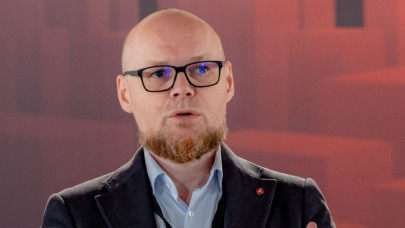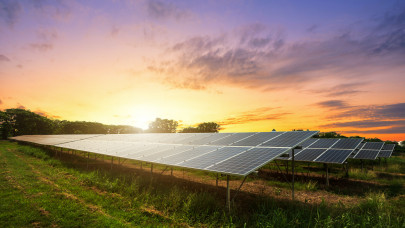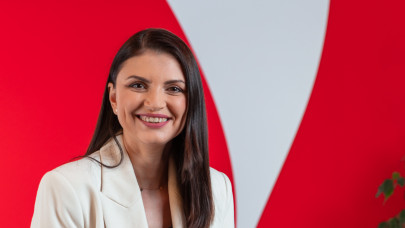You are the largest service company in Romania in electro-IT, small and large household appliances, and telecommunications. What is the company's strategy in the area of sustainability and what are the principles of sustainability that guide your activity?
Protecting the environment has always been a priority for us. Moreover, we operate in a sector that is sustainable in itself, because we give new life to IT equipment and household appliances. We support responsible consumption and reducing the amount of electrical and electronic waste by repairing and reusing products.
An important concern is the responsible recycling of household appliances so that as much material as possible can be recovered and reused as raw material in the same industry or other industries.
Also, the electronic equipment in our homes is more varied by the day and can be purchased at lower prices. Unfortunately, e-waste management is failing to keep up with current market dynamics, which has led to a problem in the sustainable disposal of old electronics. If e-waste is sent to landfills or incinerators, it can have a significant impact on human health and on the global environment as it releases toxic chemicals. Furthermore, valuable raw materials are not recovered through this e-waste disposal process, which leads to the need to extract more resources to manufacture new electronic products.
That's why we believe that reuse is a much better option than immediate recycling. In the case of electronic equipment, this means refurbishing old devices, either for sale or for donation, until they reach a very high degree of wear and tear, at which point they can be recycled.
According to recent studies, Romanians annually generate over 100,000 tons of waste electrical and electronic equipment (WEEE), which makes our country one of the most polluted European states. Only a little over a third of waste is collected. How does this figure look from the perspective of Depanero customers? Has the number of customers who prefer to repair their electro-IT products in favor of purchasing new products increased? What would be the motivations behind these choices?
Consumption behavior has been affected in recent years, first by the pandemic and then by the war in Ukraine, which has led to rising energy prices and inflation. 2022 was a bit more unpredictable, even than the pandemic year. That's why it's very hard to predict where the market and consumption are heading.
Electronic equipment is becoming increasingly affordable, however, the cost of repairing it is often considerable and customers are not inclined to repair it. Certain devices, such as computers and mobile phones, require more expensive spare parts, so end users will prefer to buy new products rather than repair or maintain existing ones, as replacing electronic components is more expensive. Consumers are therefore reluctant to repair these devices, and I am referring here, for example, to the replacement of a mobile phone screen or a laptop motherboard. Instead of repairing the laptop and using it for another two to three years, customers are opting to purchase a new laptop and use it for another eight to ten years.
In 2020, Small Domestic Appliances (SDAs) recorded the largest increase in service entries compared to 2019, by 64%, as a result of the impact the pandemic had on both purchasing and consumption behavior and product usage. Romanians spent more time at home than usual, leading to an increase in the incidence of breakdowns due to the much more intensive use of household appliances. It was no surprise, therefore, that the products associated with these activities, such as TVs and laptops/desktops and DIY categories also recorded important increases in service entries, of more than 30% for each of the mentioned categories. Other products, such as tablets, were also resuscitated during the pandemic, thanks to online school, but not at the same level as they were in the market a few years ago. Growth in the small appliances area has been linked to working from home.
We are now seeing growth even in the refurbished phone market. People are no longer throwing away their phones when they break and prefer to repair them. The average life of this type of device has increased. The phone was being replaced not necessarily because it broke down, but because another, nicer model with new technology came along. Thus, people postpone buying a new phone if the one they have is still functional, and the average life of smart devices is increasing because we no longer change them so quickly.
Which products can be repaired more easily or can be reused, refurbished/recycled?
Our service portfolio includes repair and installation services for a wide range of products, from phones, tablets, TVs, cameras, laptops, and networking equipment, to vacuum cleaners, washing machines, dishwashers, refrigerators, air conditioners, air purifiers, etc.
Many electronic products nearing the end of their life – computers, TVs, printers, refrigerators, etc. – can be reused, refurbished, or recycled. Small electronic devices such as mobile phones and laptops are the most common sources of e-waste.
In recent years, most electronic equipment includes a digital component, so there are many devices on the market with smart functions, some even based on artificial intelligence. Today's electronic devices are more technologically advanced than they were fifty years ago and are also easier to purchase. As a result, the need for maintenance and repair services is increasing, as these products require more expertise from service technicians and are more difficult to repair.
We recommend all customers, where possible, to repair defective products and reuse or donate them. At the same time, proper use and maintenance helps to reduce waste.
How can users get involved to increase the reuse of electronic devices?
To prolong the life of household appliances, we recommend that customers always follow the manufacturer's recommendations, use them responsibly, and maintain them regularly. We also recommend that before they give up one product for another with new technology, they think carefully about whether they really need a new appliance and whether the performance of their current equipment can be improved. This can also increase the average lifetime. If the device is still in good working order or just needs some minor repairs, it can be donated to family, friends, or charities. If the equipment can no longer be used, the first option would be to return it to the manufacturer. There are manufacturers who have return programs for old electronics or appliances, and information about these programs can be found on their websites. A second option would be to contact a reputable organization that deals with the recycling of household appliances and electronics and can take back products that can no longer be reused.
On the other hand, this rush to replace our devices at a rapid pace doesn't necessarily mean that old electronics end up in landfills or incinerators. Unfortunately, they are neither reused nor recycled, but sit in drawers and cupboards in our homes. Storing electronic equipment in a drawer is certainly better than ending up in landfills or incinerators, but the process of recovering the resources used to produce them is no longer taking place and we need to extract more resources. Achieving zero e-waste requires a change among consumers in how we deal (or don't) with our old electronics and appliances.
Since last year, you have launched new services in the area of green energy, including the installation of photovoltaic panels. Why did you make this decision? What did you propose?
In recent years, we have constantly diversified our service offering for both corporate and individual clients in order to respond promptly to market trends and client needs. At the same time, the unpredictability of the market over the last year has accelerated the development of new services and skills.
We have developed a dedicated B2B projects and maintenance services department and in recent years we have decided to expand our portfolio with services in the area of electric mobility and green energy: installation of charging stations for electric cars, sale and installation of complete photovoltaic systems, installation of heat pumps. We are therefore talking about a complete ecosystem, through which we offer integrated solution packages, and the installation of photovoltaic panels is a component of the B2B project department, which includes a multitude of other services, including facility management services.
In the photovoltaic area, we provide on-grid/off-grid, single-phase/three-phase photovoltaic installation services, with a 3-year warranty on workmanship and a 20-year warranty on solar panels. Depanero has obtained the authorization to provide energy services from ANRE (National Authority for Energy Regulation), both for the company and for the engineers who will provide these services. Moreover, the package also includes the prosumer file, drawn up by our specialists. Orders can be placed quickly on the Depanero website, and once placed, the client will be contacted within 30 days to provide more information necessary for the design stage and for the preparation of the prosumer file.
We aim to offer clients integrated solution packages, provided by a team of experienced specialists with expertise and skills in installing new systems, as well as adding new industries to our service portfolio.
How does the market in Romania look at the moment - at the level of business consumers and household consumers- in the area of photovoltaic projects?
It's quite difficult at the moment to give any figures, but we see accelerated growth of projects in this segment. This growth is also due to government support programs for renewable electricity generation. I am referring here to the Green House Photovoltaic program (Casa Verde Fotovoltaice), organized by the Environmental Fund Administration, a program in which we have also enrolled, and which has been very successful, with budgets being exhausted in just a few minutes. Energy efficiency has become a priority, whether we are talking about large companies or individual consumers. According to ANRE, the number of prosumers in our country is constantly growing, with more than 63,000 prosumers registered at the end of April 2023, with a renewable energy production capacity of 753 MW installed capacity. By the end of 2023, the number of prosumers is expected to exceed 100,000, which offers very good prospects in terms of developing another, more sustainable type of energy.
What are the advantages of using solar energy? Is price an impediment to consumers wanting to install solar panels?
We are going through a difficult economic context. Inflation and the crisis in the energy market are impacting both local businesses and individual consumers. The use of solar energy helps to significantly reduce electricity and maintenance bills, cut carbon emissions and achieve energy independence through prosumer status.
Photovoltaic panels can be mounted on most types of buildings, whether a block, a house, a factory, or a warehouse, either on the roof or next to the structure, on the ground, with similar mounting elements. It also performs very well in three seasons of the year, and a little harder in winter or on cloudy days, with a lower production level. Even so, there are batteries to store energy on sunny days, which can be used when needed.
Whereas 25-30 years ago, the cost of energy from photovoltaic panels was very high, today it is down to a few cents per watt. Of course, this is still a significant investment in a company or family's budget, but there are financing options on the market, such as the Green House Photovoltaic subsidy program (Casa Verde Fotovoltaice) or bank loans for the purchase of photovoltaic panels. The return on investment depends on the degree of self-consumption, being on average under 10 years for the residential segment, and reducing to more than half, to 3-5 years, for the commercial segment.
What should consumers, whether they be individuals or companies, be aware of when considering the installation of photovoltaic systems?
First of all, we recommend that the installation of photovoltaic systems is done through companies authorized to provide energy services, which have the necessary skills and specialists.
The biggest challenge comes when planning and installing a photovoltaic system. A very thorough assessment is needed before making this decision. You must pay attention to aspects such as roof orientation, level of shading, snow load, obtaining building permits, the strength of the building on which the photovoltaic systems are to be installed, usage needs, correct sizing of the photovoltaic systems (if you want to install a larger capacity, and then inject it into the grid), maintenance of the systems (cleaning panels of dust or snow).
What types of CSR projects do you support and what do you have planned for the second half of this year?
Every year we support projects in the area of education. Romania continues to be attractive to foreign investors, but companies also need skilled labor, and this continues to be a challenge for the local market, where there is a shortage of staff and specialists in many industries, including the one in which we operate. This is why we believe that education is essential to build a truly functional society.
What do you think will be the most critical changes in the field in which you operate in the coming years?
We believe that 2023 will continue to be marked by unpredictability. At the same time, however, this may create new opportunities for businesses, helping them to reinvent themselves.
The idea of a zero-waste society, also known as the circular economy, is no longer just a trend. Globally, but also locally, there are many initiatives that encourage waste reduction and stimulate recycling. Moreover, since last year we have also had a legislative framework on the refurbishment and re-use of electrical and electronic equipment, which transposed a European directive and provides that a large proportion of electrical and electronic equipment and appliances nearing the end of their life can be refurbished and put back on the market. Given these prospects, we expect the need for specialized services to increase, and a major challenge will be to find specialists in the market.
Last but not least, the trends we are now seeing in our sector such as increasing digitalization, increased usage of household products, and predictive maintenance will persist in the coming years.
How many products have you repaired on average per year so far? Or if you have the total figure for 2022 or for all years of activity.
We offer consultancy, diagnosis, and rapid troubleshooting services for both warranty and post-warranty products, for the latter we offer a warranty on the repair. More than 31,000 repair tickets are opened, on average, per month in the Depanero service.
In 2020, we reached 2 million customers who benefited from consulting and repair services for electro-IT products, and the number is steadily increasing. In 2022, we reached a volume of 5 million repairs carried out, an increase due to the diversification of the services we offer, nationwide, to both individual and corporate customers, the constant conclusion of new partnerships, and an average repair time of 5 days, a very good time considering the number of brands and the mix of product categories in our portfolio.














